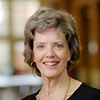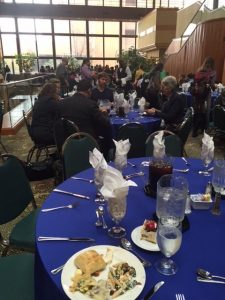This article is more than 5 years old.
On Thursday February 4, I had the opportunity to attend the eighth annual Workshop on Intercultural Skills Enhancement and Conference hosted by Wake Forest University held at the Winston-Salem Marriott in beautiful downtown Winston-Salem. Because of my recent appointment to the newly formed Arrive@Wake Board (part of Wake’s Quality Enhancement Plan), Leigh Stanfield encouraged me to attend. This conference had attendees from study abroad programs in colleges and universities across the United States.
It was a delight to be able to participate in a conference outside the world of libraries! The first person I met when I walked in the door of the Marriott was Niki McInteer, who is the WFU Associate Dean International Admissions. We introduced ourselves to each other and quickly figured out that we were both on the Arrive@Wake Board. It was wonderful to meet her and to learn that so far, Wake has 1,300 international student applicants (a record!).
The keynote speaker for the Opening Plenary was James Pellow, President and CEO of the Council on International Education Exchange (CIEE). According to their website, they are “the world leader in international education and exchange.” One of the main points of his speech focused on the needed for increased intercultural competency. He presented the findings from a study that found that employees in the global market desire intercultural communication skills above all other skills, even above language skills (which was second in the survey).
The first breakout session I attended was titled “Micro-Practices to Develop Intercultural Competencies” led by Adriana Medina at the University of Maryland, Baltimore County. It was perhaps the best breakout session I have ever attended at any conference. She gave seven competences crucial for a successful study abroad experience: description, observation, ability to ask questions, flexibility, adaptation, keeping an open mind, and engaging in ambiguity. For each competency, she had group activities to demonstrate these concepts, all of which could be easily adapted to teach students preparing for study abroad.
The next breakout session I attended was titled “Demystifying Intercultural Outcomes Assessment and the Changing Assessment Paradigm” led by Darla Deardorff at Duke University. This session was theoretical with no examples given of what authentic assessment looks like. I can tell you some things I learned: Pre/Post tests are insufficient assessments, a standardized tool does not sufficiently assess, and outcome assessment is different from program assessment. We are to move to learner centered assessment, find authentic evidence, assess from multiple perspectives, use a holistic approach, and it should be about the process (not numbers). By the end of the session, it was very clear to me that I like concrete examples in presentations.
Overall, it was a wonderful day and I’m thankful I had the opportunity to participate. I have already been able to use many of the concepts I learned in my position on the Arrive@Wake Board.
By the way, the logistics for this conference were all top notch–delicious, abundant, and beautiful food. The picture was from lunch held in the Garden Room of the Embassy Suites. At my table were people from UNC-G, Amsterdam, Indiana, and Pennsylvania. My respect for the WFU Center for Global Programs & Studies has grown immensely and I am grateful for the opportunity to be a part of this conference.

